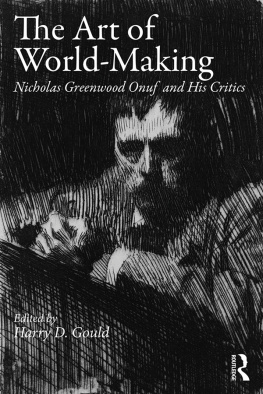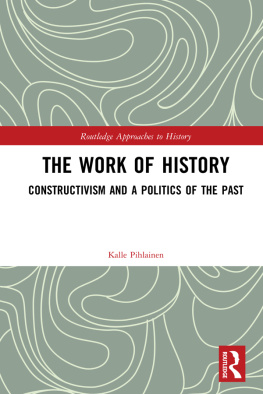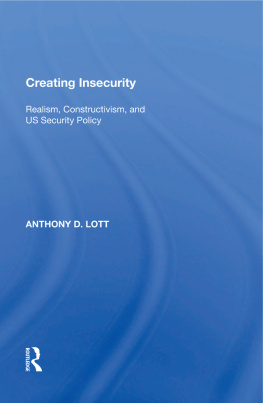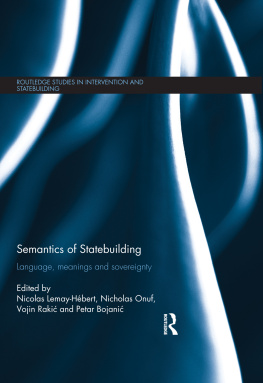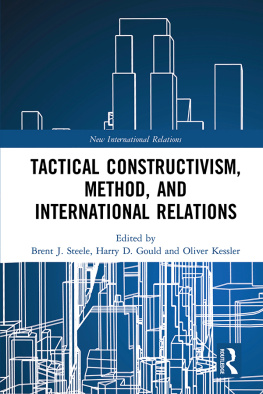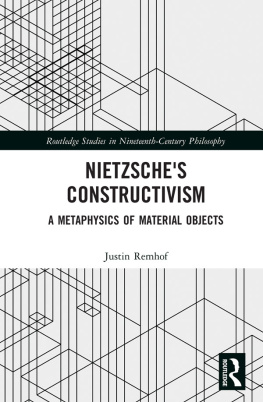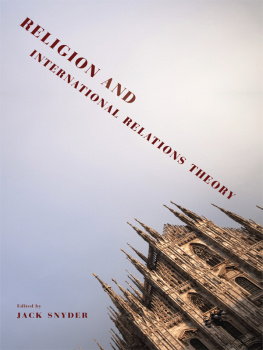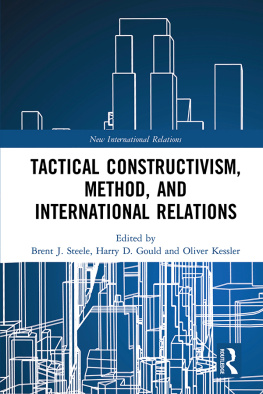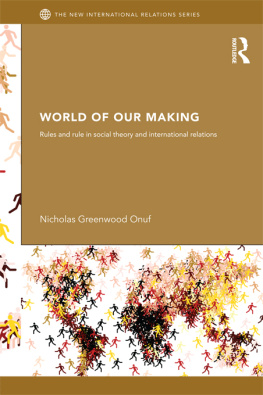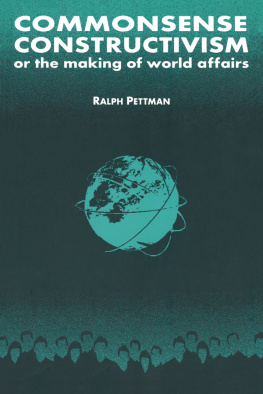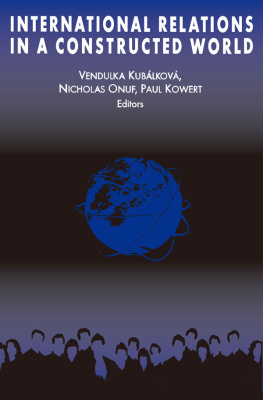Not long before I left Washington in 1994, graduate students in the Political Science Department at Johns Hopkins University asked me to come to Baltimore for a talk. The two cities are less than an hour apart and I took my PhD at Hopkins, but I had not been back to campus in at least twenty years. As instigator and host, Tony Lang made the occasion a memorable one. I encouraged him to keep in touch, and he sent me dissertation chapters. Once I was ensconced in Miami, we had an opportunity to spend several hours talking about the politics of agency (Lang 2002, ).
While Tonys work then and since draws on diverse sources, all of which link ethics and politics through agency, no one has figured more centrally in his thinking than Hannah Arendt. She was a republican theorist, though unconventional. Tony credits me with drawing attention to the place of republican thought in international relations; at the same time, he was moving in that direction. In the years since, we have both drawn much sustenance from Aristotle, who, as Tony observes in his essay, grounds my understanding of Republicanism. Very much as I see myself, he ranges far and wide, and he has a sense for the way diverse ways of thinking connect. Perceptively, he sees how international legal theory brings together my apparently unconnected work on Constructivism and Republicanism.
In Tonys brief account, Constructivist scholarship contrasts with World of Our Making s pessimistic conclusion. Rule may change its form, but exploitation will always rule. As Tony sees it, such a position dismisses the possibility of meaningful change by denying efficacy to agency and relevance to ethics. World has always provoked the charge that its world never changes, to which I have always retorted that its world changes with every deed, every word. I knew, however, that I had neglected to conceptualize the kinds of change that institutions undergo when agents act and, by acting, change the rules even when they act as the rules would have them act.
I sought to rectify this omission in a piece called The Constitution of International Society (1994), where, as Tony says, I identify five kinds of change graded by scale: cumulative, legal, constitutional, revolutionary and transformative. I had also claimed that institutions are layered sets of rules, each differing in kind, but I failed to show adequately that there is a systematic relation between rule-layers and kinds of change. It had been my plan to do just this. The plan went awry as I began to doubt that institutions actually do exhibit a general pattern in the layering of their rules.
Any republican would take revolutionary change into consideration. This is the kind of change that self-empowered agents bring about (Onuf 1994, 19). Aristotle reviewed the causes of revolution thus conceived and suggested ways to prevent it. Arendt attended to revolutionary change, and so does Tony. As he points out, my brother Peter and I gave a good deal of attention to the age of revolutions, 17761814 (Onuf and Onuf 1993), but we had little to say about revolutionary politics. The contrast with Arendt could not be sharper. Arendt found in revolution a concept that highlights the potential of an active political life, a concept that has its source in the republican Machiavelli of the Discourses .
Tonys essay compares Arendts assessment of the American Revolution with the one that Peter and I advance. Both treatments acknowledge the importance of longstanding constitutional practices and republican sentiments, including the pursuit of happiness so often misconstrued as a liberal tenet. Peter and I attach more importance to the federal principle than she does. That she called this great legacy of eighteenth-century political theory Madisons discovery (Arendt 1972, 159) is ill informed. That she thought the Constitution left no space for town-republics stems from her disregard of the federal principles full extension: union as republic, state republics (Art IV, Sec 4), counties, towns, cities endowed with republican charters and specified powers. Both treatments make much of constituent power or popular sovereignty. Peter and I see the ratification process as an exercise of constituent power state by state, thanks to federal principle. Yet both the United States and France formalized constituent power through constitutional assemblies. So what can Arendt add?
For Tony, it would be by bringing forth the moment of founding not the serial ratification of the Constitution in 1788 but the struggle for independence heralded by Thomas Paine and the Declaration of Independence a dozen years earlier. Everything hinges on the who and why of the moment. If indeed the Declaration of Independence was an expression of constituent power, then its signers can hardly be claimed to have represented the whole people. They did represent a significant segment of the public who, as British subjects, felt that they were disproportionately bearing the cost of empire and driven to revolt by metropolitan indifference to their complaints. At least initially, they had no sense that they were constituting a new order.
Arendts heroic moment supports a political ideology of self-empowerment all but stripped of its republican character. Arguably this has been the fate of subsequent revolutions French, Haitian, Russian, and Chinese despite the lingering stink of republican pieties. The properly republican alternative is constitutional change, for all its challenges. The bigger question is transformative change. Here I say: changes in the conditions of rule correlate with changes in what it is possible to think.
References
Lang, Jr. Anthony F. 2002. Agency and Ethics: The Politics of Military Intervention . Albany: State University of New York Press.
Onuf, Nicholas Greenwood. 1994. Levels. European Journal of International Relations 5 (1): 3558.
Onuf, Peter and Nicholas Onuf. 1993. Federal Union, Modern World: The Law of Nations in an Age of Revolutions . Madison: Madison House Publishers.
First published 2017
by Routledge
2 Park Square, Milton Park, Abingdon, Oxon OX14 4RN
and by Routledge
711 Third Avenue, New York, NY 10017
Routledge is an imprint of the Taylor & Francis Group, an informa business
2017 selection and editorial matter, Harry D Gould; individual chapters, the contributors
The right of Harry D Gould to be identified as the author of the editorial material, and of the authors for their individual chapters, has been asserted in accordance with sections 77 and 78 of the Copyright, Designs and Patents Act 1988.
All rights reserved. No part of this book may be reprinted or reproduced or utilised in any form or by any electronic, mechanical, or other means, now known or hereafter invented, including photocopying and recording, or in any information storage or retrieval system, without permission in writing from the publishers.
Trademark notice: Product or corporate names may be trademarks or registered trademarks, and are used only for identification and explanation without intent to infringe.
British Library Cataloguing-in-Publication Data
A catalogue record for this book is available from the British Library
Library of Congress Cataloging-in-Publication Data
A catalog record for this book has been requested
ISBN: 978-1-138-28549-1 (hbk)
ISBN: 978-1-138-28548-4 (pbk)
ISBN: 978-1-315-26893-4 (ebk)
Typeset in Bembo
by Apex CoVantage, LLC
A wonderfully engaging and illuminating appreciation of the groundbreaking scholarship of Nicholas Onuf taking the unusual form of a stimulating series of interactive essays of appreciative analysis and response. Valuable as an authoritative account of Constructivism as political thought and practice, heightened by Onufs high quality participation, part intellectual autobiography, part conceptual.

